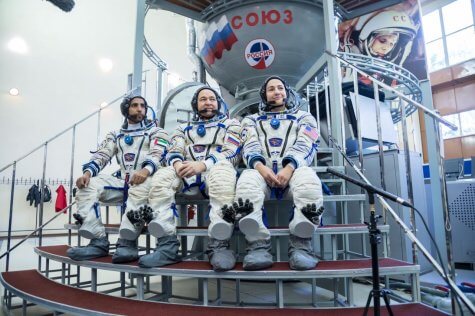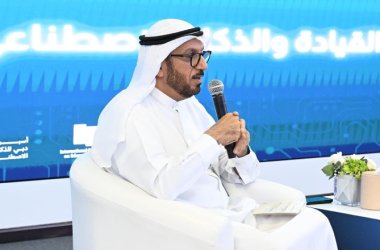
Hazzaa Al Mansoori, the first Emirati astronaut to travel to the International Space Station (ISS), and Sultan AlNeyadi, the back-up astronaut for the same mission, have successfully completed their final tests for the mission, WAM reported.
The mission, which will take place on 25th September, entails Al Mansoori carrying out 16 scientific experiments in cooperation with international space agencies.
The tests, which were conducted at the Yuri Gagarin Cosmonaut Training Center, in Star City, in Moscow, started with the astronauts saluting the commanders at the training center and then choosing their tests scenario.
All scenarios are in sealed envelopes and astronauts get to pick one before the start of the exam. The tests lasted over six hours per day as each crew was examined separately.
According to the report, the tests included dealing with emergency situations, Simulation of the Russian segment in ISS, the Functional Cargo Block (FGB) mock-up, and Data Management System, as well as the Soyuz Complex simulation.
The final tests included simulating a number of crew emergency situations during take-off, landing, and docking, while on board the ISS, in addition to dealing with the false operation of the landing sensor, propulsion system problems, interruption of contact, and increased CO2 while aboard the Soyuz spacecraft.
In the emergency simulation of the Russian segment in ISS, astronauts successfully passed the test of the failure of communications device, the oxygen supply system, power outages, the failure of fire detection systems, and how to deal with emergency situations.
Yousuf Hamad AlShaibani, Director General of the Mohammed bin Rashid Space Centre (MBRSC), said, “We are proud of AlMansoori and AlNeyadi’s success in the final tests, as it confirms that the Emirati people are worthy of the UAE’s wise leadership belief in their ability to succeed in facing challenges in different sectors and disciplines. Our mission is to ensure that the UAE Astronaut Programme is a sustainable one and we aim to train and prepare more Emirati astronauts to contribute to the enrichment of the Arab region, as well as the global scientific community.
“The ISS mission will pave the way for more human spaceflights by the UAE, which will significantly contribute to developing a future map to explore deep space,” added AlShaibani.
The mission, which will take place on 25th September, entails Al Mansoori carrying out 16 scientific experiments in cooperation with international space agencies, making the UAE the 19th country to get a foothold on the ISS and contribute to scientific research.





